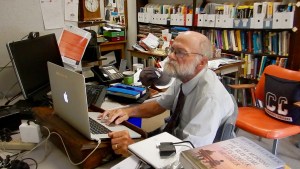
I have very few spare minutes today. With aging comes an increased awareness of the fact that I no longer can successfully delude myself about my ability to multi task (see this link). Fortunately I can count upon my trustworthy student research team and student research assistants to get things done in an excellent and timely fashion. They make me look better than I am. As I learned today, I also can learn so much from my former students. As I have shared several times in articles on LinkedIn, there are a multitude of under recognized learning opportunities and resources within one’s workplace (see my thoughts by clicking this link). We all have pieces of a solution to puzzling problems.
My research team is sharpening their learning tools – and their minds— on the purported efficacy of “brain-training” programs (click here for more). Do they work? What are appropriate indices for assessing improvements? What claims do companies make for products related to brain training? How good are the studies cited? Are there differences in effectiveness as a function of age, expectations, or health of the customer?
During our first week together we have focused on team-building, assessing current critical reading skill abilities, and identifying what technology learning skills are most likely to advance our success. My research team created a Facebook group to facilitate communication among us. I would have chosen differently based upon my familiarity with the visionary work the past decade of Jane Hart identifying Top Learning Tools (click here for more about this). But I have already learned much about the strengths and weaknesses of this Facebook as a group communication tool.Nonetheless, I can learn much from those like my talented students whom I mentor .
Having identified several individuals knowledgable about brain-training interventions and aging (all Carroll graduates!), we soon will be drawing upon their expertise (and their generosity) via Skype interactions. (Thank you in advance, John and Michelle). Though I have used Skype in the past to communicate with educators in Lithuania and Turkey, with former students and friends in Nicaragua and England, and with a nephew and his beautiful family in Switzerland, I am well aware that Skype is an evolving tool. My learning never ends. Also, there are numerous alternative tools which can accomplish the same communication goal (click here for some examples). Also, I have Skyped across a number of machines (Mac, iPad, PC, and phone) and Skype ids! Hence, I posted on Facebook a request for help from individuals who might be willing to help me practice Skype. That you, members of my extended Carroll Facebook community.
Yesterday I practiced Skyping within my office suite with one of my research assistants (who playfully morphed into a space alien) –and I learned how to morph into a frog. Thank you, Tia! Now if I can only figure out how to turn off those camera effects:)

It dawned upon me at 5:30 this morning that there probably are excellent Skype tutorials available to me on the dramatically improved LinkedIn Premium account I have invested in (Thank you, CEO of LinkedIn Jeff W.). I was correct. However, as I was about to invest an hour of my precious time going through an excellent tutorial there, a former student—Luis (now in Virginia) reached out to me via Skype with an invitation to join him in a Skype session. We systematically reviewed and discovered capabilities of Skype I need to know. Thank you, Luis, for providing me with just in time learning.
Today I met with a very precocious first year student whom I first met when I interviewed her two years ago. Her mother and Aunt are both Carroll alumni. She taught me a lot even in my first sustained interaction. Thank you Deborah and Meredith for sending her my way.
Learning never ends. Don’t overlook the tremendous learning resources available to you by your reaching out to your employees, former students, and colleagues. Think outside your title and and outside your role.

I think it’s great to be able to appreciate the value that can come from stepping out of one’s title. This is a great notion to promote. Many people become bogged down (I think) by trying to constantly uphold a particular image that they believe is commensurate with their position or title. I believe, while there are times when this is appropriate, there are times when this limits thinking. I believe a large responsibility for someone with the privilege of having the authority that titles give us is knowing when to “lower the gates.”
Thanks for your thoughtful response.Inevitably there will be uneasiness initially as one steps outside one’s role.